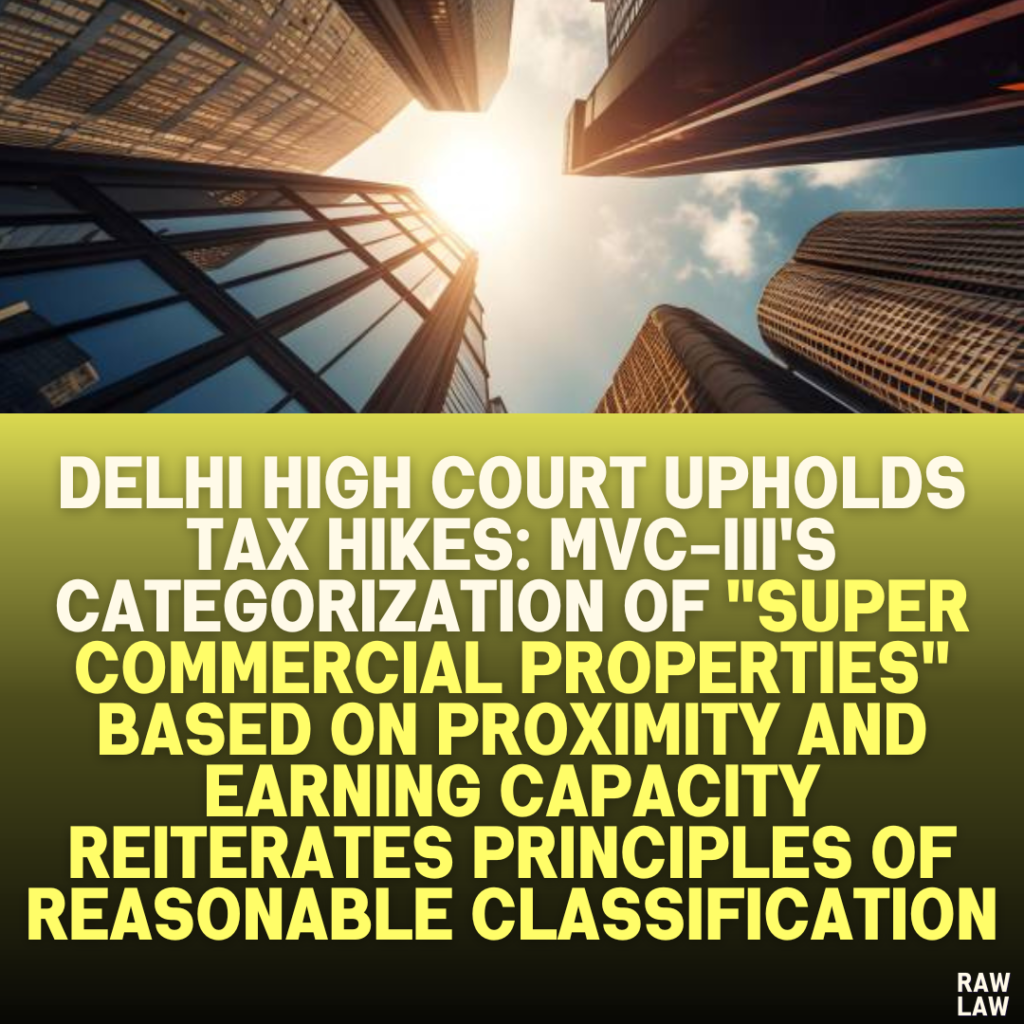Court’s Decision:
The Delhi High Court dismissed the batch of writ petitions challenging the recommendations of the Municipal Valuation Committee-III (MVC-III) under Section 116 of the Delhi Municipal Corporation Act, 1957 (DMC Act). It upheld the legality of the MVC-III’s categorization of certain properties as “Super Commercial Properties” for tax assessment. The court emphasized that the categorization adhered to statutory guidelines, and no violation of Article 14 of the Constitution was established.
Facts:
- Petitioners’ Properties: The petitioners included shop owners in malls, multiplex owners, entities operating at metro station complexes, and owners of industrial units (flatted factories). They challenged the categorization of their properties as “Super Commercial Properties.”
- Implementation of MVC-III:
- The MVC-III was constituted under the DMC Act to recommend classifications for property tax purposes. It categorized certain properties as “Super Commercial Properties,” which resulted in significant hikes in property tax.
- This included recalibration of factors like unit area value (UAV), occupancy, and structure factors.
- The revised recommendations were implemented retrospectively, which further aggravated grievances.
- Nature of Challenges:
- Petitioners claimed the categorization was arbitrary and lacked legal basis.
- Many questioned the retrospective application of the revised tax rates from 2008-09.
- The categorization purportedly imposed higher taxes without offering additional benefits.
Issues:
- Reasonable Classification:
- Does categorizing properties as “Super Commercial Properties” under MVC-III satisfy the constitutional test of reasonable classification under Article 14?
- Retrospective Taxation:
- Was the Municipal Corporation of Delhi (MCD) justified in reopening property tax assessments for past years?
Petitioners’ Arguments:
- Violation of Section 116A:
- Section 116A outlines the parameters for property classification, including settlement patterns, civic infrastructure, and access to roads and markets. The petitioners argued that the categorization of “Super Commercial Properties” was not envisioned in the statute and went beyond MVC-III’s jurisdiction.
- Arbitrary Classification:
- Properties in malls and metro station complexes were allegedly singled out without any intelligible differentia or rational nexus with taxation goals.
- Properties located in similar colonies or categories were taxed differently.
- Unlawful Retrospection:
- Assessment orders revising taxes retrospectively were argued to be void, citing the principle of limitation under the DMC Act and previous judicial decisions.
- Discrimination Without Benefits:
- The classification imposed higher tax rates without any corresponding enhancement of facilities or services.
- Improper Process:
- Petitioners argued that MVC-III failed to adequately address objections during its deliberations.
Respondents’ Arguments:
- Adherence to the DMC Act:
- The categorization was within MVC-III’s jurisdiction under the DMC Act, which authorizes the committee to recommend classifications based on objective criteria.
- Binding Nature of MVC Recommendations:
- Section 116B makes it binding for MCD to implement MVC recommendations.
- Economic Rationale:
- The classification was based on economic wisdom, considering factors like proximity to commercial centers and potential earning capacity of the properties.
- Self-Assessment Obligations:
- Petitioners were obligated to file accurate self-assessments under Section 123D. The Corporation was justified in reopening assessments due to suppression of information.
- Limited Judicial Review:
- Tax policy decisions based on economic rationale should not be easily overturned unless clear jurisdictional errors are shown.
Analysis of the Law:
- Reasonable Classification:
- Article 14 allows classification if it is based on intelligible differentia and has a rational nexus with the objective. The court found that MVC-III’s categorization of “Super Commercial Properties” met these requirements.
- Unit Area Method (UAM):
- The UAM, introduced by the 2003 Amendment to the DMC Act, calculated property tax based on the unit area value (UAV) and various factors such as structure, occupancy, and usage. The shift from “Rateable Value” to UAM was upheld in previous judgments like Vinod Krishna Kaul.
- Retrospective Assessments:
- The court acknowledged that retrospective assessments must adhere to statutory limitations but found no procedural violations by the MCD in this case.
Precedent Analysis:
- Vinod Krishna Kaul v. Lt. Governor NCT of Delhi:
- Upheld the constitutionality of the 2003 Amendment and the MVC’s authority to recommend classifications.
- Ved Marwaha v. NDMC:
- Held that retrospective assessments are limited by procedural constraints and time limits.
- Municipal Corporation of Delhi v. Aurobindo Education Society:
- Affirmed the principle that reasonable classifications in tax laws are permissible if supported by economic rationale.
Court’s Reasoning:
- Reasonable Classification:
- The court found that the classification of “Super Commercial Properties” was based on proximity to commercial centers and earning capacity, which were reasonable criteria under the DMC Act.
- Tax Policy as an Administrative Function:
- Courts should defer to the expertise of administrative bodies in matters of economic policy unless a clear legal violation is shown.
- No Arbitrariness or Illegality:
- MVC-III followed statutory procedures, including addressing objections, before finalizing its recommendations.
- Adherence to the DMC Act:
- The classification was aligned with Section 116A, which allows the MVC to create groups based on specific factors like settlement patterns and access to infrastructure.
Conclusion:
- The court dismissed the petitions, holding that the MVC-III recommendations and resulting tax hikes were lawful.
- Retrospective assessments were upheld as valid within the framework of the DMC Act.
- The petitioners’ claims of discrimination and arbitrariness were not substantiated.
Implications:
- Reinforcement of the Unit Area Method:
- The judgment validates the UAM as an efficient and legally sound method of property tax assessment.
- Administrative Discretion in Taxation:
- It affirms the broad discretion of municipal bodies in determining tax policies, provided statutory guidelines are followed.
- Impact on Commercial Properties:
- The decision may lead to increased tax liabilities for properties classified under “Super Commercial Properties,” setting a precedent for future assessments.
